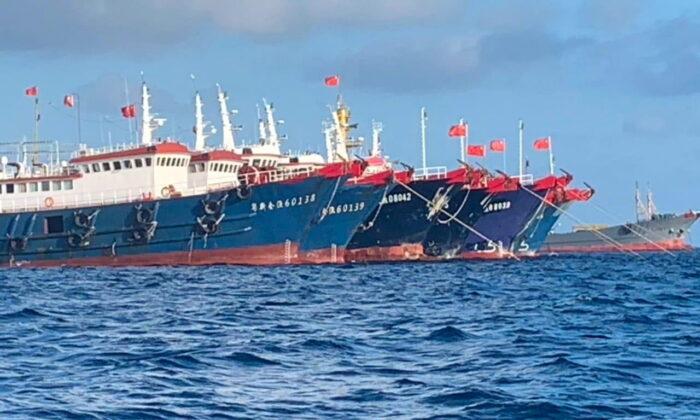China’s communist regime is illegally expanding its territory through the South China Sea and deliberately altering its interpretation of history to maintain its ill-gotten gains, according to one expert.
“History, for the Chinese government, is plastic and can be changed and molded as necessary, as any good communist party knows,” said Gregory Poling, a senior fellow at the Center for Strategic and International Studies (CSIS), a Washington-based think tank.
Poling added that the current Chinese Communist Party (CCP) leadership believes that the United States is in “terminal decline” and that it has been more ready to engage in hostilities since the ascension of Xi Jinping as head of the CCP in 2012.
Territorial Disputes
Understanding the history of the various claims to the South China Sea, and the United States’ role in those claims, is vital for understanding the current moment in the Indo-Pacific, Poling said.“The history we have of the South China Sea is skewed,” Poling continued. “The territorial disputes at this point are over a century old and what often gets missed in the history as we usually tell it is that the U.S. has been there the whole time.”
Poling explained that the United States’ role in shaping the Indo-Pacific is older than that of the CCP, and that its motivations stemmed from its position in the region as a “resident power” due to its colonial holdings in the Philippines during the early 20th century.
“At their core, U.S. interests have remained pretty steady,” he said.
Among those interests, he said, are maintaining alliance commitments and upholding international maritime law to ensure access to sea lanes for the international community.
Unlike the United States, however, Poling said that the CCP’s claims to the region are largely created from thin air and that CCP leadership had drawn off a section of the South China Sea on a map and arbitrarily claimed everything inside, despite having no presence on any of the islands in the region at the time.
“No Chinese official had ever set foot on [the Islands],” Poling said. “They didn’t know what they were claiming. They just drew a line around it and said any rocks or islands you can find anywhere in the line belongs to China. And that is the basis of China’s claims from the 1930s until at least the early 1990s.”
CCP Aggression
Since then, the regime has created numerous artificial islands throughout the region, which it has used to base military equipment and inflate its claims. This has ensured that the CCP has access to the region’s rich fishing and natural gas reserves while simultaneously blocking off those resources from the greater international community.“All of this is clearly illegal, in contravention of the U.N. Convention on the Law of the Sea, which China helped negotiate,” Poling said.
“Now, suddenly, China is making these claims that directly infringe on the rights of U.S. ships, U.S. planes, U.S. citizens, and are threatening to undermine the whole regime of international maritime law which the U.S. is so deeply invested in.”
The CCP has continued unimpeded in its efforts to expand its access to strategic resources, largely succeeding by targeting small, unaligned nations for intimidation, being ever so sure not to drag the United States into its various disputes.
Now, Poling said, the United States had all but lost the Indo-Pacific region and would need to create immense diplomatic and economic pressure on Beijing in order to open the South China Sea back up completely.
With every new island and military installation, Poling said, the CCP was “tightening the noose” on the region and threatening to turn the South China Sea into a “Chinese lake.”
“China now has considerable overmatch with the U.S. locally,” Poling said. “It dominates the air, the sea, the electromagnetic spectrum.”
“We’re getting dangerously close to the point where freedom of navigation no longer exists in the South China Sea.”






Friends Read Free